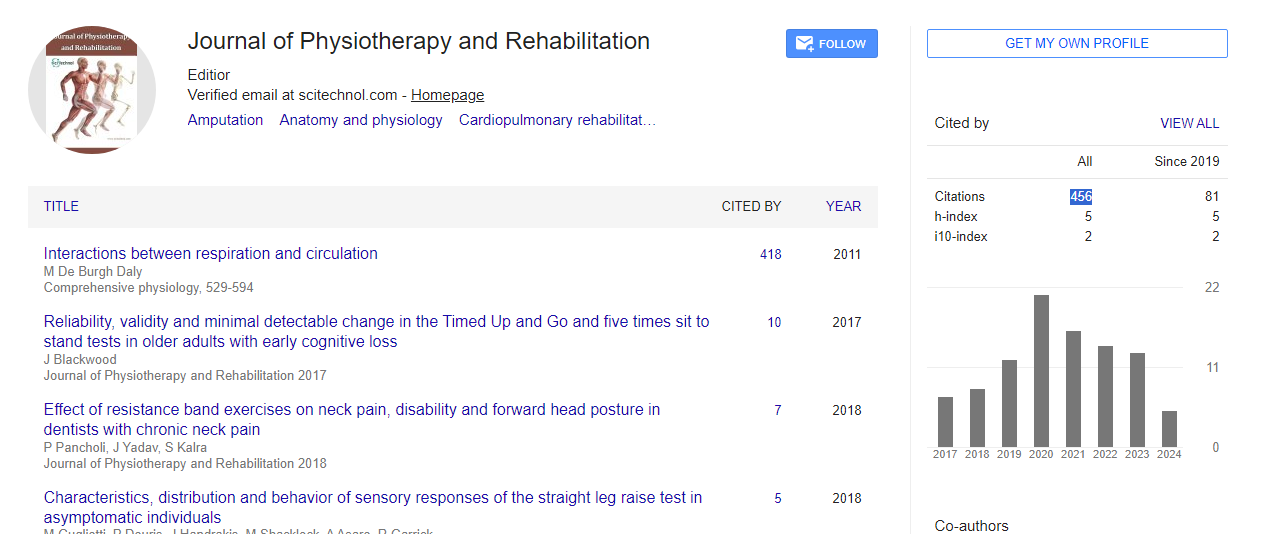Perspective, J Physiother Rehabi Vol: 8 Issue: 5
Effects of Stress Reduction Techniques in Rehabilitation on Immune Function and Inflammatory Response
Liam Sinclair*
1Department of Physiotherapy, Child Development Centre, Kempston, UK
*Corresponding Author: Liam Sinclair,
Department of Physiotherapy, Child
Development Centre, Kempston, UK
E-mail: liamsin@clairedu.uk
Received date: 24 September, 2024, Manuscript No. JPTR-24-151640
Editor assigned date: 26 September, 2024, PreQC No. JPTR-24-151640 (PQ);
Reviewed date: 10 October, 2024, QC No. JPTR-24-151640
Revised date: 17 October, 2024, Manuscript No. JPTR-24-151640 (R);
Published date: 24 October, 2024, DOI: 10.4172/JPTR.1000184.
Citation: Sinclair L (2024) Effects of Stress Reduction Techniques in Rehabilitation on Immune Function and Inflammatory Response. J Physiother Rehabi 8:5.
Description
Stress plays a significant role in overall health, particularly in its impact on immune function and inflammatory responses. In the context of rehabilitation, stress reduction techniques have gained attention for their potential to enhance recovery outcomes and support immune health. The relationship between stress, the immune system and inflammation is complex, with stress having a documented negative effect on immune function. Chronic stress can lead to dysregulation of the Hypothalamic Pituitary Adrenal (HPA) axis, resulting in increased levels of cortisol and other stress hormones. Elevated cortisol can suppress the immune response, impairing the body’s ability to fend off infections and recover from injuries.
Incorporating stress reduction techniques into rehabilitation programs can provide a comprehensive approach to healing. Various methods, including mindfulness meditation, yoga, deep breathing exercises and progressive muscle relaxation, have been shown to reduce stress levels effectively. These techniques not only promote relaxation but also foster a sense of control over one’s body and mind, which can be particularly beneficial for individuals undergoing rehabilitation. Research indicates that regular practice of mindfulness and yoga can lead to significant reductions in perceived stress and anxiety levels. Furthermore, these practices have been linked to improved psychological well-being, which is important for individuals recovering from injuries or surgeries.
The physiological benefits of stress reduction techniques extend to immune function and inflammatory responses. Studies have shown that mindfulness practices can lower levels of pro-inflammatory cytokines, which are molecules that promote inflammation in the body. Chronic inflammation is associated with numerous health issues, including autoimmune diseases, cardiovascular diseases and metabolic disorders. By reduce inflammation, stress reduction techniques can support the body’s healing processes and improve rehabilitation outcomes. Moreover, stress reduction techniques can positively impact the psychological aspects of rehabilitation. Psychological stress is often a barrier to adherence to rehabilitation protocols, leading to poor outcomes. By reducing stress and anxiety, individuals may be more motivated to engage in their rehabilitation exercises and adhere to treatment plans. This increased engagement can lead to improved physical outcomes, such as greater strength, flexibility and functionality. The integration of stress management into rehabilitation programs not only addresses the physical aspects of recovery but also supports mental health, promote a comprehensive healing environment.
Physiotherapists and rehabilitation professionals are increasingly recognizing the importance of addressing psychological factors in their practice. By incorporating stress reduction techniques into treatment plans, healthcare providers can create a more supportive and effective rehabilitation experience. For example, integrating mindfulness exercises into physical therapy sessions can help patients manage pain and stress more effectively. Additionally, educating patients about the impact of stress on their health and recovery can empower them to take an active role in their rehabilitation journey.
Conclusion
The effects of stress reduction techniques in rehabilitation extend beyond relaxation. By positively influencing immune function and reducing inflammatory responses, these techniques can enhance recovery outcomes and overall well-being. The integration of practices such as mindfulness, yoga and deep breathing exercises into rehabilitation programs offers a comprehensive approach to healing, addressing both physical and psychological aspects of recovery. As research continues to support the benefits of stress management in rehabilitation, it is essential for healthcare professionals to adopt these techniques to advance an environment conducive to healing.
 Spanish
Spanish  Chinese
Chinese  Russian
Russian  German
German  French
French  Japanese
Japanese  Portuguese
Portuguese  Hindi
Hindi 